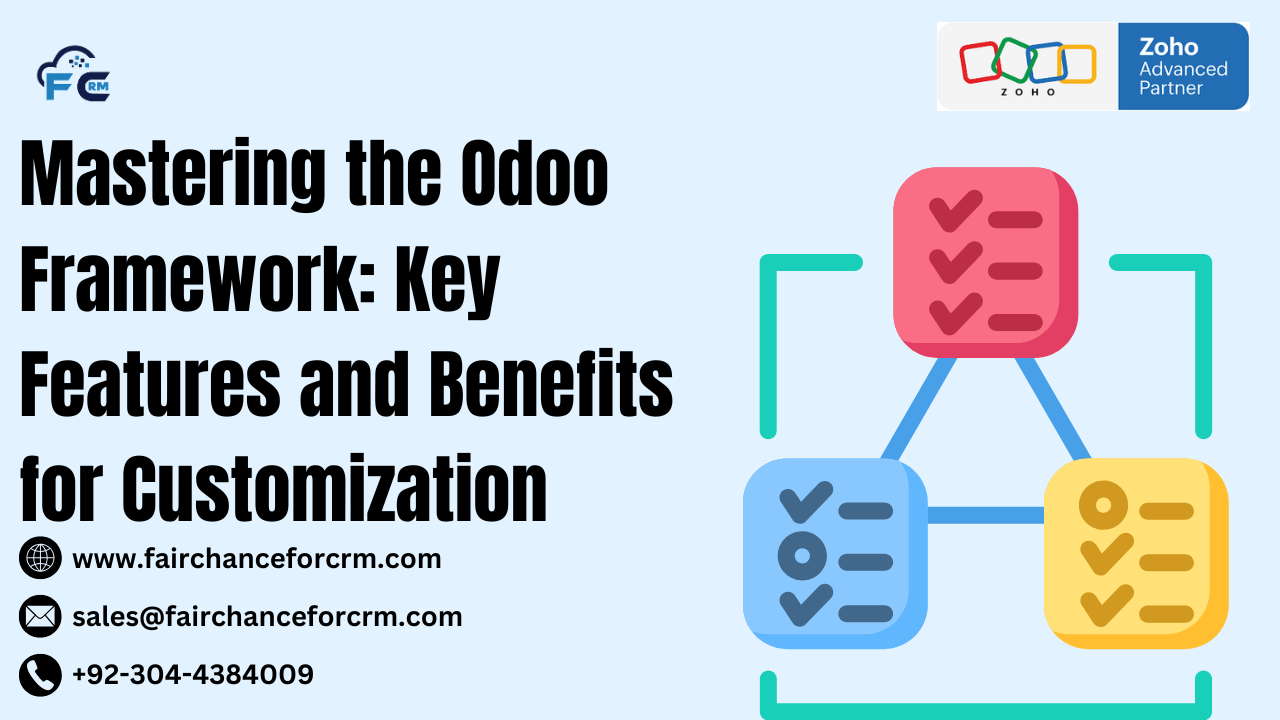Odoo Framework is today our topic. In the ever-evolving business landscape, companies strive to streamline their operations, improve efficiency, and enhance collaboration. One of the most popular open-source ERP (Enterprise Resource Planning) solutions today is Odoo, a comprehensive suite of business applications that covers various business needs such as accounting, inventory management, human resources, CRM, project management, and more. Odoo is not just an ERP tool; it’s an entire Odoo Framework that provides businesses with the tools to manage almost every aspect of their operations seamlessly.
Also Read:
- Odoo Editions
- ERPNext vs Odoo
- How to Create and Use a Slider in Odoo
- How to Create a Custom Revenue Report in Odoo
- Top 8 Zoho CRM Integrations of 2025
What is Odoo Framework?
Odoo is an open-source ERP platform that enables businesses of all sizes to manage a wide range of operations from a unified interface. It was originally launched as “OpenERP” in 2005 and was later renamed Odoo in 2014 to reflect its broadened scope beyond just ERP applications. Over the years, Odoo has evolved into one of the most popular ERP solutions globally, thanks to its flexibility, scalability, and the ability to be customized to suit different industries and business models.
The core of Odoo’s appeal lies in its modular nature. The Odoo Framework consists of more than 30 core business applications, with thousands of additional modules contributed by a strong community of developers. These modules can be installed as per the specific requirements of a business, ensuring that the software can grow and adapt with the organization.
Key Features of Odoo Framework
- Modular Structure: Odoo is built around a modular Odoo Framework, meaning businesses can pick and choose from a variety of pre-built modules that align with their operational needs. Whether it’s managing accounting, sales, inventory, HR, or manufacturing, each module is designed to work independently or integrate seamlessly with others.
- Customization and Flexibility: One of the key advantages of Odoo is its flexibility. Odoo offers powerful customization capabilities, allowing businesses to modify existing modules or build new ones to suit their specific needs. Developers can work with Odoo’s easy-to-use tools and Python-based programming environment to tailor the platform. This adaptability makes Odoo an excellent choice for businesses in virtually every industry, from retail to logistics to service-based companies.
- User-Friendly Interface: The user interface (UI) of Odoo is sleek, modern, and intuitive. It is designed to provide a user-friendly experience even for individuals with minimal technical knowledge. The dashboard gives users a central hub where they can track key performance indicators (KPIs), monitor projects, and access all important functions of the ERP system.
- Integration with Other Tools: One of the powerful features of Odoo is its ability to integrate with a variety of third-party software and services. Whether you need integration with e-commerce platforms like Shopify or online payment systems like PayPal, Odoo has built-in connectors that enable businesses to automate and streamline their operations. Additionally, Odoo can integrate with various external systems via APIs, ensuring that businesses can sync data across different platforms effortlessly.
- Multi-Language and Multi-Currency Support: Odoo is designed for global businesses, providing multi-language and multi-currency support. This makes it easy for companies operating in multiple countries to manage their operations and financials in their native languages and local currencies. The platform also supports localization, ensuring compliance with local tax laws and regulations.
- Cloud and On-Premise Deployment: Odoo offers both cloud-based and on-premise deployment options, giving businesses the flexibility to choose how they want to deploy the software. The cloud version comes with automatic updates, backups, and scalability, while the on-premise version offers more control over the infrastructure. Businesses can choose the deployment model based on their specific needs, security preferences, and budget.
- Mobile Compatibility: In today’s mobile-first world, having access to business management tools on the go is crucial. Odoo provides a mobile-friendly interface that allows users to access and manage their tasks from smartphones and tablets. This flexibility ensures that business operations are never interrupted, even when teams are working remotely or on-site.
- Business Intelligence and Reporting: Odoo offers robust reporting tools and real-time analytics that help businesses make data-driven decisions. With built-in dashboards and detailed reports, users can gain insights into their financial health, sales performance, inventory levels, and more. The Business Intelligence (BI) module enables advanced data analysis and helps businesses make informed decisions for growth.
Benefits of Using Odoo Framework
- Cost-Effective: As an open-source platform, Odoo offers businesses access to a powerful ERP solution at a fraction of the cost of proprietary software. The community edition of Odoo is free to use, while the enterprise version offers premium features for a subscription fee. The flexibility of Odoo allows businesses to start small and scale up as needed, ensuring that they only pay for what they use.
- Time Savings and Efficiency: By centralizing multiple business functions in one system, Odoo significantly reduces the time spent on manual data entry, reporting, and communication between departments. Automation features such as workflow automation, email integration, and task management help businesses streamline their daily operations and focus on strategic goals.
- Improved Collaboration: Odoo’s integrated nature promotes collaboration among employees, departments, and even external partners. Features like internal messaging, shared calendars, and document management ensure smooth communication and coordination within the organization. Additionally, managers can assign tasks, monitor progress, and collaborate on projects in real time.
- Scalability: As businesses grow, so do their needs. Odoo is designed to scale with a company’s growth, providing the ability to add new modules or extend existing ones. Whether you’re a startup or a large corporation, Odoo can be tailored to fit your organizational size and complexity.
Odoo vs. Other ERP Systems
While there are other ERP systems available in the market, such as SAP, Oracle ERP, and Microsoft Dynamics, Odoo stands out for several reasons:
- Affordability: Odoo offers a more cost-effective solution compared to many other ERP platforms, particularly for small and medium-sized businesses (SMBs).
- Open-Source: Being open-source gives businesses more control over their data, customization options, and long-term costs.
- Modularity: Odoo’s vast library of modules means that businesses can tailor their solution according to their needs. Other ERP systems often come with pre-packaged functionality that may be harder to customize.
Conclusion
Odoo Framework has emerged as a game-changer in the world of enterprise software, providing businesses with an all-in-one solution to manage their operations more efficiently. Its modular architecture, ease of use, and extensive customization options make it suitable for businesses of all sizes, from startups to large corporations. With the ability to integrate with other software, provide real-time analytics, and offer a flexible deployment model, Odoo is helping organizations stay ahead in a competitive and fast-paced business environment. Whether you’re in retail, manufacturing, services, or distribution, Odoo offers a robust framework to simplify business processes and fuel growth.
For more information about the Odoo Framework, visit this link.
If you want to Free Trail Zoho, click on this link.




